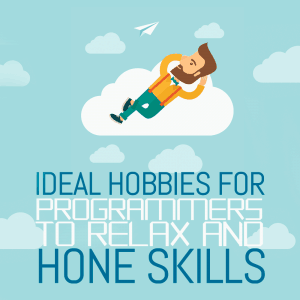 Programming is a rewarding profession, but it can also be hectic, stressful, and mentally exhausting. Programmers who don’t find ways to relax are at risk of burning out.
Programming is a rewarding profession, but it can also be hectic, stressful, and mentally exhausting. Programmers who don’t find ways to relax are at risk of burning out.
One of the best ways for people in stressful jobs to relax is to cultivate hobbies.
For many professionals, engaging in a hobby is a highly rewarding relaxation technique. However, programmers are one of the least likely professionals to engage in a hobby that doesn’t involve coding. In competitive work environments, pressure is high to be the best at algorithms, coding languages, or even tech industry policy. As a result, most programmers dedicate their free time to more work.
Hobbies do tend to get a bad rap in time-consuming jobs like coding. Programmers may think of having a hobby as a waste of time that could be put to better, work-related use. However, research and anecdotal evidence show how having a hobby can actually benefit a person’s primary profession.
Certain hobbies allow programmers to hone skills that come in handy in the profession. More importantly, dedicated coders can get some much-needed mental rest and relaxation with a hobby.
There is a host of hobbies to choose from, depending on your preferences. You can dedicate as much time to them as you like, as your career and the usual schedule allow. Here is a list of hobbies uniquely suited for programmers that offers skills-based benefits as well as stress-busting rewards.
Tinker With a Raspberry Pi
Messing with a Raspberry Pi—the tiny computer the size of a deck of cards (and affordable too)—is sort of a rite of passage for budding coders. These single-board computers are commonly used to design web servers, laptops, and even gaming consoles. But the Raspberry Pi is not just about work. There’s an ardent hobby community around the Pi that pushes the boundaries of what these tiny computers can do.
Hobbyists have used Raspberry Pi processors to design automated craft beer breweries at home, create a better version of Google Glass, and even to make miniature drones to send up to near space. The truly adventurous can connect a Raspberry Pi to an Arduino computer kit to come up with their own world-changing project.
Not only are Raspberry Pi projects fun, but they can also be quite productive. For example, loads of hobbyists take up home DIY projects involving a Raspberry Pi. You can use the tiny device to reprogram your microwave, set up a home security system, or more popularly, a design retro gaming rig.
Programmers who are reluctant to take up a hobby can start a project with a Raspberry Pi. Engage in a fun Pi-based activity to get your mind off work without feeling too out of your zone. The possibilities for Raspberry Pi-based projects are nearly endless. You can test your imagination and analytical skills and improve your existing programming skills with this hobby. And don’t forget the sheer excitement of starting a personal project.
Play a Musical Instrument
A surprising number of computer professionals have a musical background, notes Bill Poucher, Baylor University professor and the executive director of the International Collegiate Programming Contest.
When professor Poucher was at a coding contest in Europe, he randomly asked a group of programmers from different countries and diverse backgrounds whether they played a musical instrument. About three out of every four hands went up, as he recalls. The relationship between programming and musical composition may not be a quirky coincidence.
Music is related to programming, since both fields rely on extensive learning about processes. Playing a musical instrument actually helps your brain develop the areas that process language and math. Research has suggested that learning to play a musical instrument improves analytical and fine motor skills.
Studies have shown that those who play musical instruments have a stronger corpus callosum—the part of the brain that connects the two hemispheres. Playing music increases the number of left-right connections in the corpus callosum, which improves overall brain function related to memory, problem-solving, and executive thinking.
So if you’re looking for a brain-improving hobby that will, in turn, help you become a better programmer, learning to play a musical instrument would do the job. Try not to sweat over the learning process being too difficult. You can start with a music tutor, or just go online and watch YouTube tutorials for the musical instrument of your choice.

Learn Photography
Photography is a beloved hobby that is well-suited for programmers. Professional photographers use some of the similar skills programmers rely on daily.
For nonphotographers, taking pictures professionally may seem as easy as focusing a camera at something and clicking the shoot button. Despite certain myths, photography involves a lot more work than just pointing and shooting. Those breathtaking photos in National Geographic, for example, were taken by photographers who carefully selected their equipment and overcame natural challenges.
Like programmers, photographers need top-notch problem-solving skills. While you can customize the camera as you like, you can’t do the same with nature. Being a photographer will teach you how to find workarounds to natural settings beyond your immediate control, like sunlight and obstacles.
Programmers can certainly geek out over camera equipment. You may not deal with hardware a lot in your work life when you program, but you can make up for it by taking up photography.
Most hobbyists find photography to be immensely relaxing because it requires you to look at your surroundings in a way you don’t usually do. This hobby can take you to beautiful locations far away from the drudgery of office work.
Perhaps the most crucial skill programmers can hone by taking up photography as a hobby is patience. Photographers often have to wait for hours or even camp out for days to get the perfect shot. As a programmer, you would know how valuable patience is to your craft. With photography, you can fine-tune your patience threshold and become better at what you love to do.
Read Whatever You Like
Yes, reading can be a great hobby, and it is a wonderfully stress-busting one. Reading has been scientifically shown to reduce stress levels and help busy people like programmers relax.
The best part about reading is that its benefits are essentially the same as those of programming whether you are engrossed in the International Journal of Applied Mathematics or a Harry Potter book. Famous computer scientists like Bill Gates are also ardent readers. Reading is known to have a positive effect on memory, focus, and concentration—three things programmers cannot do without.
Some people like to read books and articles to expand their knowledge, while others love to read for fun. Reading nonwork-related, fantastical escapist fiction is a popular way to relax on weekends.
Reading also improves analytical skills, making it even more appealing to programmers. Pouring over complexly composed text helps readers become better at essential analytical skills like critical thinking, problem-solving, and communication.
Reading is also a great way to improve your writing skills. Programmers don’t typically get good training in composition, though it’s a skill that becomes important later in the career. Programmers often have to explain complex situations in simple terms to get a message across clearly. Reading is possibly the best way to learn to write better memos, project proposals, academic papers, and everything else.
Reading isn’t a physically demanding hobby, either. You can just lie down on the bed and start reading. It’s a highly beneficial hobby for those who want to gain a lot by giving only a little of their time. Busy programmers can easily introduce reading times into their lives by dedicating small 15- or 30-minute windows to the activity on mornings and evenings.
Cook for Fun
Pretty much all of us love eating, so learning to cook well is not just a fun activity, it’s a crucial survival skill!
For programmers, cooking offers a host of benefits. Some leisure cooks say that it’s relaxing and soothing—mostly because you get to eat delicious food when all the work is done. The various rituals associated with the activity—like slicing, dicing, and sautéing—may even offer a type of meditative reprieve for hobbyist cooks.

Plus, cooking is the perfect hobby for programmers with families. You can cook for them and enjoy quality time with your spouse, parents, and kids.
Cooking is highly scientific, too. Even an amateur cook knows that the tricks of the trade lie in following recipes precisely, especially when baking. Miss a spoonful of sugar or mess up a couple of grams of the ingredients, and the final result will be a disaster. Programmers, just like the pro cooks, know the importance of paying attention to detail and following the right steps in the correct order.
You may not think of it right away, but cooking does involve a hefty amount of problem-solving skills and imagination. Putting a recipe together is as much about finding quick solutions as it is about shopping for the right ingredients. And the most enjoyable part of cooking lies in tinkering with recipes to see if you can make it better. Sound familiar?
Play Logic Games
Harnessing logical skills is absolutely important in programming. So, naturally, playing logic games can be a highly mentally and professionally stimulating hobby for programmers. Logic games are puzzles that require deductive thinking to solve (and ultimately win). These games vary significantly in complexity. You can try playing a simple logic game like Tetris or work your mind playing Sudoku.
Fortunately, the modern mobile and console-based gaming world has no lack of logic games to play. From Brain Age to the infamous “Catherine,” there’s a logic or puzzle game for just about every taste.
You can play them on your internet browser, Facebook, gaming consoles, smartphone, or trusty laptop. You don’t even have to pay much. There are free logic games that are just as good as the paid games.
While there’s no scientific backing to claims that logic games “improve” your brain, these games can, however, improve your memory and analytical skills. Besides, they are darn fun to play.
Choose the Right Hobby for You
Steve Wozniak loves Segway Polo. Oracle’s Larry Ellison is very much into boating. Marissa Meyer obsessively bakes cupcakes. You too can improve your professional and personal life by engaging in any of the hobbies suggested above.
Having a hobby as a programmer can help prevent burnout in your professional career. It can act as a gateway to true relaxation during your weekly routine. Hobbies can even help you develop mental capabilities that will help you become better in your profession.
Choose a hobby that you genuinely like and would ideally help you develop a skill and relax at the same time. If a hobby doesn’t work out for you, then don’t hesitate to try another. Your options aren’t limited; you can try anything that interests you, and you’ll soon start to enjoy the many benefits of having a hobby.
